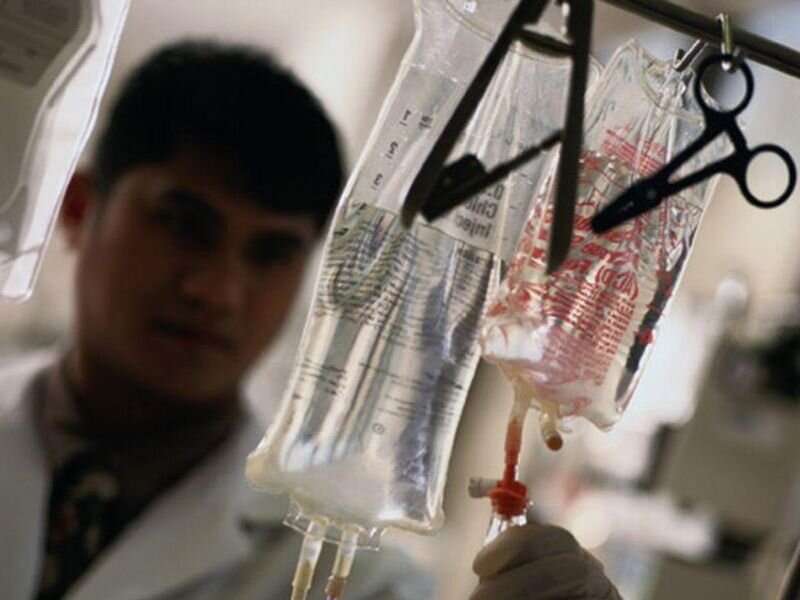Moving monoclonal antibody treatments for COVID from hospital to home

(HealthDay)—Antibody infusions help keep high-risk COVID-19 patients out of the hospital, but getting the therapy can be a challenge. One U.S. health system has found a creative way to address the problem: home infusions administered by paramedics. They delivered antibody infusions to 144 COVID-19 patients in their homes over three months earlier this year.
Most—about 95%—avoided hospitalization for worsening COVID-19 symptoms.
While COVID-19 hospitalizations have been declining recently, the United States is still averaging more than 6,600 new hospital admissions for the infection each day, according to the U.S. Centers for Disease Control and Prevention.
When people at high risk of severe COVID-19 do contract the virus, there is a way to lower their odds of ending up in the hospital: an infusion of monoclonal antibodies.
Monoclonal antibodies are lab-engineered proteins that are similar to the antibodies the immune system churns out to fight infection. Those used against COVID-19 are designed to recognize the spike protein on the SARS-CoV-2 virus.
Three such drugs are authorized for use in the United States—to be given to patients with milder COVID-19 who are at increased risk of becoming severely ill. Clinical trials showed they cut the risk of hospitalization by 70%.
The catch is that monoclonal antibodies have to be infused by a medical professional.
"What's difficult is that it requires human resources," said Dr. Anurag Malani of St. Joseph Mercy Hospital in Ann Arbor, Mich.
Health systems have different ways of providing infusions, such as in the emergency room or at outpatient clinics. During a COVID-19 surge, that can tax the health care facility, and it also requires sick patients to travel.
That can be a particular barrier for low-income patients, Malani noted.
"Sometimes people don't have transportation—they have to take the bus," he said. "Or a relative may need to take a day off of work to drive them."
So the St. Joseph health system tried an additional option: having paramedics provide home infusions.
Between February and May, 144 patients in three Michigan counties received home infusions. The approach mostly worked without a hitch; three patients had a hypersensitivity reaction to the infusion and had to be taken to the hospital.
In the end, most patients avoided a COVID hospital stay. Eight were ultimately hospitalized for worsening COVID-19 symptoms, but none required a ventilator and all survived, according to the report published online recently in JAMA Network Open.
Not every COVID-19 patient is eligible for monoclonal antibody therapy, but a substantial number are. Among them are adults aged 65 and older, pregnant women and people who are overweight or have medical conditions such as diabetes, heart disease, high blood pressure and chronic lung diseases like asthma.
What's critical is that eligible patients get referred for monoclonal antibody therapy early, said Dr. Richard Wadas of the University of Pittsburgh Medical Center (UPMC).
That means people with potential COVID-19 symptoms should get tested promptly, he said.
Monoclonal antibodies need to be given within 10 days of the first symptoms, and the earlier the better.
At UPMC, Wadas said, efforts to expand access to monoclonal antibodies began soon after they were authorized. That included setting up numerous outpatient sites where patients in surrounding areas could get infusions.
"We didn't want this to only be available in downtown Pittsburgh," Wadas said.
But home infusions are available, too. UPMC works with an area home infusion agency to provide them to patients who cannot get to outpatient sites—because of medical conditions or disabilities, for example.
Wadas said he "applauds" the Michigan health system's innovative tactic. "Paramedics certainly have the skill set to do this," he said.
In the UPMC region, however, emergency medical services are currently so strained that they wouldn't have the "bandwidth" for the extra, and time-consuming, task, Wadas said.
Different tactics will work for different health systems, Malani said, and enlisting paramedics to provide home infusions may be a good option for some.
As for cost, monoclonal antibody drugs are free. But there is still the cost of providing them. St. Joseph patients who received home infusions were not charged, Malani noted. Medicare footed the bill for beneficiaries, and the health system covered the costs for patients not on Medicare.
And while monoclonal antibodies can prevent hospitalizations, they are no substitute for vaccination, Wadas stressed.
"If you're vaccinated, your body will already know what to do when it's exposed to the virus," he said. "You need to get vaccinated."
More information: The U.S. Department of Health and Human Services has more on monoclonal antibody therapy for COVID-19.
Anurag N. Malani et al, Administration of Monoclonal Antibody for COVID-19 in Patient Homes, JAMA Netw Open (2021). DOI: 10.1001/jamanetworkopen.2021.29388
Copyright © 2021 HealthDay. All rights reserved.



















